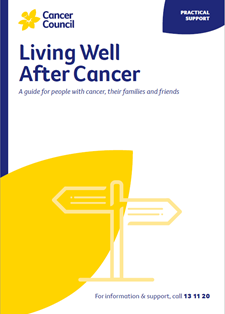- Home
- Cancer Information
- Living well
- Living well after cancer
- Adjusting to life after treatment
- Finding a “new normal”
- Myths about the end of treatment
Myths about the end of treatment
I should be back to normal
You may have thought you would just resume your life exactly where you left off before the cancer diagnosis. The reality is often more complex. Some cancer survivors find they can’t or don’t want to go back to how life was before their treatment. Others need time to recover from treatment before they return to their usual activities.
I should feel well
On the outside, you may look healthy. On the inside you may still be recovering physically and emotionally. Many cancer survivors have ongoing health concerns because of the cancer or treatment side effects.
I should not need any more support
You may feel a bit lost when you stop seeing your treatment team, family and friends so often. Some survivors are surprised to find they need more support than ever after treatment ends.
I should feel grateful
Survivors can sometimes feel pressure to be grateful for having survived cancer. Instead, the impact of cancer on your life and future may make you feel upset, angry or resentful.
I should be celebrating
You may think that you should be happy because you survived the diagnosis and feel guilty or confused if you’re not happy all the time.
I should feel positive
Friends and family may pressure you to think positively all the time. Although it is unrealistic to think positively all the time, this can be a source of worry for survivors.
I should be the person I was before cancer
Many survivors say that cancer changes them. You may have a sense of loss for the person you once were or thought you’d be. It can also be difficult when the people around you expect you to return to how you were.
I should be making plans
You may feel both excited and anxious when treatment ends. Many survivors need time to reflect on what has happened before they can think about the future.
I should make big changes
You may feel guilty if you return to your pre-cancer way of life instead of making big changes to your way of life.
More resources
Prof Michael Jefford, Medical Oncologist and Director, Australian Cancer Survivorship Centre, Peter MacCallum Cancer Centre, VIC; Lucy Bailey, Nurse Counsellor, Cancer Council Queensland; Philip Bullas, Consumer; Dr Kate Gunn, Clinical Psychologist and Senior Research Fellow, Department of Rural Health, University of South Australia, SA; Rosemerry Hodgkin, 13 11 20 Consultant, Cancer Council WA; Prof David Joske, Clinical Haematologist, Sir Charles Gairdner Hospital and Clinical Professor of Medicine, The University of Western Australia, WA; Kim Kerin-Ayres, Clinical Nurse Consultant, Cancer Survivorship, Concord Hospital, NSW; Sally Littlewood, Physiotherapist, Seymour Health, VIC; Georgina Lohse, Social Worker, GV Health,VIC; Melanie Moore, Exercise Physiologist and Clinical Supervisor, University of Canberra Cancer Wellness Clinic, ACT; June Savva, Senior Clinician Dietitian, Nutrition and Dietetics, Monash Cancer Centre, Monash Health, VIC; Dr Elysia Thornton-Benko, Specialist General Practitioner and Research Fellow, University of New South Wales, NSW; Prof Janette Vardy, Medical Oncologist, Concord Cancer Centre and Professor of Cancer Medicine, The University of Sydney, NSW; Lyndell Wills, Consumer.
View the Cancer Council NSW editorial policy.
View all publications or call 13 11 20 for free printed copies.
Need to talk?
Support services
Life after cancer treatment
Programs and support for people who have finished treatment
Cancer Council Online Community
A community forum – a safe place to share stories, get tips and connect with people who understand
Cancer information
Nutrition and cancer
How to eat well during and after cancer treatment
View our publications
Guides and fact sheets for people with cancer, their families and friends

